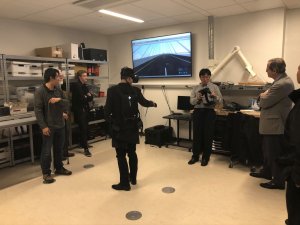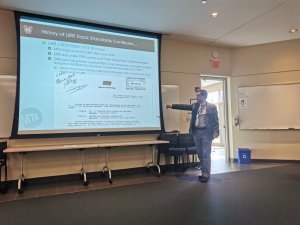As the USDOT Region 2 University Transportation Center, part of CAIT’s mission is to share the innovative tools, technologies, and processes that its researchers develop with the right stakeholders so that they can be implemented and solve the most pressing challenges today’s transportation network and industry faces. This month, we have been busy doing just that through meetings, technical presentations, and more. Read about some of our most notable accomplishments below.
Technical Dinner and Tour: Rutgers Virtual Reality Lab
![]()
CAIT-affiliated researcher Dr. Jie Gong hosted American Society of Civil Engineers (ASCE) members, industry professionals, students, and more for a tour and walkthrough of his Virtual Reality (VR) Lab as well as a technical dinner presentation earlier this month.
He demonstrated the lab’s different capabilities and various projects centered on the collection and processing of large geospatial data sets for coastal community resilience, the use VR environments for work zone training, and more.

Dr. Jie Gong demonstrated his Virtual Reality Lab and his recently developed environments to stakeholders. Photo ©Michael O’Connell.
More specifically, Dr. Gong and his students used Mobile Light Detection and Ranging (LiDAR) systems to collect modeling data of towns impacted from natural disasters, including Hurricanes Katrina, Irene, Harvey, and Michael.
The LiDAR data was then uploaded to a 3D modeling software also developed by Dr. Gong’s team.
With this software, they can estimate the damage and costs of future natural disasters through simulating various flood-level heights within the town the model-data was taken. This project, funded by The Federal Emergency Management Agency (FEMA), can assist authorities and decision makers in planning for future natural disasters.
Dr. Gong’s team also developed VR environments for work zone training. The environments are modeled after a large cable-stayed bridge and an in-service pump station that has entered a critical state.
Workers can use these environments to simulate work zone conditions including traffic, weather, and time of day to train crews in a variety of activities such as cone placement, traffic regulation, and more. Specifically, in the critical facility, they can test emergency protocols and putting out fires in a safe and efficient way.
Sustainable Long Island Committee Meeting
![]()
CAIT and University Transportation Center (UTC) partner Farmingdale State College recently made presentations to stakeholders and members of the United States Green Building Council- Long Island Chapter’s (USGBC-LI) Sustainable Transportation Committee.
Committee members included representatives from Nassau and Suffolk counties, the City of Port Washington, Sierra Club, USGBC-LI, consulting firms, Suffolk Community College, and Farmingdale State College.
Dr. Ali Maher, Director of Rutgers CAIT, highlighted the projects and capabilities of the USDOT Region 2 UTC Consortium. Emphasis was made on close collaboration between university members and the availability of subject matter experts to study the most challenging issues in the region. In particular, CAIT’s efforts in damage assessment, analysis of infrastructure stability, and other areas after Superstorm Sandy were discussed as being applicable to Long Island cities and communities in preparing for possible future storm events.
Dr. Barbara Christe, Dean of the School of Engineering Technology at Farmingdale State College presented on the school’s newly established workforce training program for Infrastructure Cyber Security, Transportation, and Emergency Preparedness.

Photo ©USGBC-LI.
Dr. Christe emphasized the new micro-credential courses, credits, and certificates being offered for students and working professionals through their program. She also discussed tailoring the micro-courses to fit the needs of the agencies and municipalities and asked the committee members to spread the availability of these services to their partners.
At the end of the presentations, possible future collaboration between the organizations was discussed.
Rutgers Rail & Transit Seminar Series
![]()

Mr. Yifeng Mao, from LIRR, presented to the Rutgers community. Photo ©Dr. Xiang Liu.
Railroad track standards are always in a state of being updated and improved upon.
These improvements can have tremendous cost-saving benefits, can reduce potential safety risks, and are important for fostering innovation and progress.
At the inaugural seminar hosted by CAIT’s Rail & Transit Program, Mr. Yifeng Mao and Mr. Hiren Kantilal Joshi, leaders from the Long Island Rail Road’s (LIRR) Track Standards and Specifications Department, discussed their commitment to innovation in the railroad industry, the latest engineering skills and industry knowledge, and some of the company’s recent and innovative work updating and preserving track standards and designing new turnouts on the LIRR.
Consortium students and members of the Rutgers community attended the free seminar, which was designed to help engineering students learn more about track standards and turnouts, as well as the rail industry in general.

